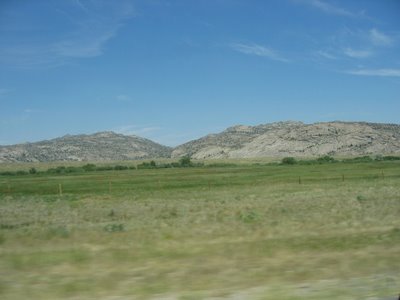thea and me

I read a passage from Willa Cather's "The Song of The Lark" a couple days ago and found complete affinity--a true romance--with Thea Kronborg, a young Swedish girl whose family settled in the Colorado countryside. She is a character whose feelings mirror my own so completely, that I wonder if Cather had some foreknowledge of my arrival on this earth nearly one hundred years later, and if she wrote this passage just for me.
Fortunately, I find my own real-life Thea in my sister Lane who loves the stories lost and found in the western landscape as much as I do. I had my own plains experience with her this summer, as we forged through a beautiful-but-no-longer-wild stretch of road (if you don't count some scary gas n' sips) in southern Wyoming. The above picture of Martin's Cove was taken from our more modern wagon.
This is Cather's account of Thea's visit to Wyoming, near Laramie, where "the wagon-trails of the Forty-niners and the Mormons were still visible." Every once in a while, I read a passage so fitting and accurate, it both paralyzes and inspires me. This is one of those that simultatnouesly reminds me why I write and makes me question why I even try. So goes the constant ebb and flow of self-doubt and passion that lie at the crux of trying to translate one's feelings into words. Cather's work explains clearly and plainly my own thoughts, and does it so much better than I could ever hope to.
"The road they followed was a wild and beautiful one. It led up and up, by granite rocks and stunted pines, around deep ravines and echoing gorges. The top of the ridge, when they reached it, was a great flat plain, strewn with white boulders, with the winds howling over it. There was not one trail, as Thea had expected; there were a score; deep furrows, cut in the earth by heavy wagon wheels, and now grown over with dry, whitish grass. The furrows ran side by side; when one trail had been worn too deep, the next party abandoned it and made a new trail to the right or left. They were, indeed, only old wagon ruts, running east and west, and grown over with grass. But as Thea ran about among the white stones, her skirts blowing this way and that, the wind brought to her eyes tears that might have come anyway. The old rancher picked up an iron ox-shoe from one of the furrows and gave it to her for a keepsake. To the west one could see range after range of blue mountains, and at last the snowy range, with its white, windy peaks, the clouds caught here and there on their spurs. Again and again, Thea had to hide her face from the cold for a moment. The wind never slept on this plain, the old man said. Every little while eagles flew over.
"Coming up from Laramie, the old man had told them that he was in Brownsville, Nebraska, when the first telegraph wires were put across the Missouri River, and that the first message that ever crossed the river was "Westward the course of Empire takes its way" ... Thea remembered that message when she sighted down the wagon tracks toward the blue mountains. She told herself that she would never, never forget it. The spirit of human courage seemed to live up there with the eagles."



No comments:
Post a Comment